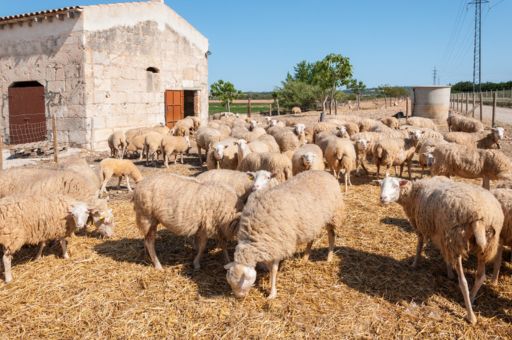It reinforces the position and proposal of the Regional Ministry of Agriculture, Fisheries and the Environment in the RASVE Committee and makes use of the exception allowed by the agreement for island territories to maintain their eradication programme.
The Regional Ministry of Agriculture, Fisheries and the Natural Environment, through the Directorate General of Agriculture, Livestock and Rural Development, has brought together representatives of the Professional Agricultural Organisations (OPA) and cooperatives, the Livestock Health Defence Associations and their veterinary technicians and the Island Councils to explain the recent agreement adopted by the RASVE Committee on 9 January about the change in national strategy about bluetongue and the position of the Balearic Islands. It should be remembered that this committee is the highest competent body at the national level in matters relating to animal health and is made up of the director general of Agri-Food Production Health and Animal Welfare of the Ministry of Agriculture and the competent directors general of the autonomous communities.
TDB keeps you informed. Follow us on Facebook, Twitter and Instagram
The Balearic Islands livestock sector is unanimous in its support for the Government to continue with the bluetongue eradication programme
As a result of the complex situation that is being experienced throughout Spain concerning bluetongue, on 18 December the RASVE Committee met to propose and discuss a profound change in the bluetongue eradication programme that Spain has been carrying out for more than 20 years. The Director General of Agriculture, Livestock and Rural Development, Fernando Fernández, explained that, as recognised by the RASVE Committee, the change of position is due to different exceptional circumstances; the simultaneous circulation of four serotypes at the same time in Spain (1, 3, 4 and 8) and the fact that several Autonomous Communities are currently facing the four serotypes; an exceptional climatic situation in autumn and winter that has led to increased mosquito vector activity; the lack of stock and the difficulty in accessing vaccines against the different serotypes; and the logistical complications of such an extensive vaccination.
Faced with this situation, the Committee’s agreement establishes a change of criterion. Spain now adopts a programme of protection, not eradication, which has important implications. Thus, vaccination becomes voluntary and there is no obligation to finance it. In addition, the movement of animals is allowed under all circumstances without restriction, except for those with symptoms. The movement of bovine and ovine animals from other EU member states to the peninsular territory will also be allowed without specific conditions about bluetongue, provided that no serotypes other than those present in the peninsular territory are circulating in those member states.
In this context, the agreement finally includes the position of the Balearic Islands and establishes that the island territories will be able to maintain the control and eradication programme and establish requirements for the entry of animals into their territory. It also adds that movement from the island territories to the mainland will be unconditional except in the absence of clinical symptoms. In this sense, the Director General of Agriculture, Livestock and Rural Development has explained to the sector the Govern’s position in the Committee and has expressly asked each organisation for its position on whether or not to support the continuity of the Programme. Fernández thanked ‘the support and confidence of the whole sector in the proposal that we have put forward as an Autonomous Community. But at the same time, we are aware of the difficulties that several communities are going through as they are facing four serotypes at the same time. Therefore, we understand their position on this issue’.
The director general explained that ‘we believe that a decision of this magnitude is not a good one to take at the moment of maximum crisis. What the farmers of the Balearic Islands have been asking us to do since the beginning of the epidemic is to vaccinate in order to confront and eradicate the disease. We believe that it is not appropriate for us to send out a message now that vaccination is voluntary and that restrictions are no longer necessary. On the other hand, added Fernández, ‘abandoning the eradication strategy could mean that the disease remains permanently endemic in our country. All of Spain’s exports of live sheep and cattle rely on the external confidence of our health status. There is therefore a clear risk that this export will be considerably curtailed.
All in all, the Director General of Agriculture, Livestock and Rural Development thanked the Ministry once again for its sensitivity to the special circumstances of insularity: ‘This has allowed us to maintain the exception in the Committee’s agreement so that island territories can decide to continue with our eradication programmes. The Balearic Islands, because of our reality, we can achieve the eradication of the disease if we continue working as we have done up to now and we are sure that the livestock sector is what they want.
‘The change of strategy in the rest of the country means that we are strengthening passive surveillance actions against other serotypes. The sentinel farm programme will be reinforced in the coming weeks to provide more constant samples and to be able to detect other alerts early,’ stressed Fernández. For all these reasons, and with the unanimous support of the sector, the Regional Ministry of Agriculture, Fisheries and the Environment will inform the Ministry of its intention to continue with its eradication programme.
Finally, the director general informed the sector that the Board of Directors of the Institute for Agri-Food and Fisheries Research and Training of the Balearic Islands (IRFAP), to be held on 30 January, will approve the contract for 100,000 doses of bluetongue serotype 3, which has already reached the Region of Murcia, and the doses needed to vaccinate cattle against Epizootic Haemorrhagic Disease.
